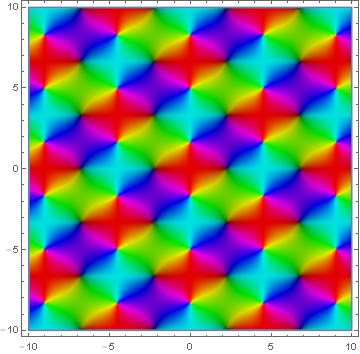Difference between revisions of "Jacobi cn"
From specialfunctionswiki
| Line 1: | Line 1: | ||
Let $u=\displaystyle\int_0^x \dfrac{1}{\sqrt{(1-t^2)(1-mt^2)}}dt = \displaystyle\int_0^{\phi} \dfrac{1}{\sqrt{1-m\sin^2 \theta}} d\theta.$ Then we define | Let $u=\displaystyle\int_0^x \dfrac{1}{\sqrt{(1-t^2)(1-mt^2)}}dt = \displaystyle\int_0^{\phi} \dfrac{1}{\sqrt{1-m\sin^2 \theta}} d\theta.$ Then we define | ||
$$\mathrm{cn \hspace{2pt}} u = \cos \phi = \sqrt{1-x^2}.$$ | $$\mathrm{cn \hspace{2pt}} u = \cos \phi = \sqrt{1-x^2}.$$ | ||
| + | |||
| + | <div align="center"> | ||
| + | <gallery> | ||
| + | File:Domcoljacobicn.png|[[Domain coloring]] of $\mathrm{cn}$ corresponding to $m=0.8$. | ||
| + | </gallery> | ||
| + | </div> | ||
=Properties= | =Properties= | ||
Revision as of 02:03, 21 August 2015
Let $u=\displaystyle\int_0^x \dfrac{1}{\sqrt{(1-t^2)(1-mt^2)}}dt = \displaystyle\int_0^{\phi} \dfrac{1}{\sqrt{1-m\sin^2 \theta}} d\theta.$ Then we define $$\mathrm{cn \hspace{2pt}} u = \cos \phi = \sqrt{1-x^2}.$$
Domain coloring of $\mathrm{cn}$ corresponding to $m=0.8$.
Properties
- $\mathrm{sn \hspace{2pt}}^2u+\mathrm{cn \hspace{2pt}}^2u=1$
- $\mathrm{cn \hspace{2pt}}(0)=1$
- $\mathrm{cn \hspace{2pt}}$ is an even function
- $\dfrac{d}{du}\mathrm{sn \hspace{2pt}} u =\mathrm{cn \hspace{2pt}}(u)\mathrm{dn \hspace{2pt}}(u)$
References
Special functions by Leon Hall
